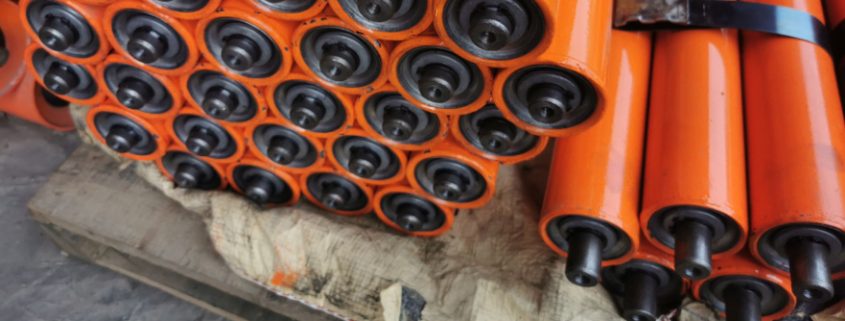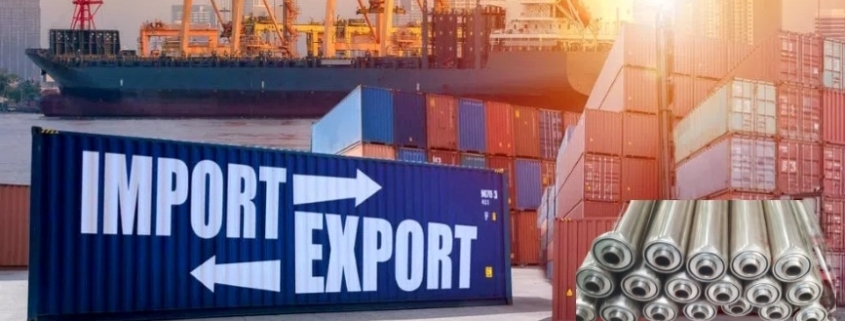In the realm of industrial operations, the role of high-quality conveyor belts is pivotal. These belts facilitate the smooth and efficient movement of goods across various stages of production and distribution. Opting for substandard belts can lead to frequent downtime, repairs, and even unsafe working conditions, thereby inflating operational costs and compromising workplace safety. Therefore, selecting the right conveyor belt rubber suppliers becomes a crucial decision for businesses aiming to enhance their production efficiency and safety standards. By choosing a reputable supplier, companies ensure that they receive belts that are not only durable and efficient but also tailored to meet the specific needs of their operations. This strategic choice significantly influences the overall productivity and cost-efficiency of industrial activities, making it an essential consideration for businesses looking to optimize their operational dynamics.
Read moreUnderstanding the conveyor belt rubber weight is essential for the design, specification, and operation of conveyor systems used across various industries. The weight of the conveyor belt rubber significantly affects the performance, efficiency, and cost-effectiveness of these systems. Accurately calculating this weight ensures proper handling, installation, and function, preventing potential overloads or failures. In industrial applications, the weight impacts the motor’s power requirements and structural integrity of the conveyor setup. Moreover, knowing the specific weight per unit area helps in determining the total load that the conveyor will need to move, which directly influences the selection of the motor and the design of the framework. This knowledge is not only critical for achieving optimal operational efficiency but also for ensuring safety and longevity of the conveyor system itself.
Read moreConveyor rollers are essential components in the automation of material handling across various industries, including manufacturing, logistics, and packaging. These rollers facilitate the smooth and efficient movement of goods, significantly reducing labor costs and enhancing workflow. The focus on the China conveyor roller market is particularly relevant due to the country’s substantial manufacturing base. China boasts a vast range of conveyor roller manufacturers and suppliers, making it a global hub for conveyor technology. This abundance not only offers a variety of choices for businesses around the world but also drives competitive pricing and innovation within the industry. As such, understanding the dynamics of China conveyor roller market is crucial for companies looking to optimize their operations and supply chain logistics.
Read moreConveyor roller belts are essential components in modern material handling systems. These belts, featuring rollers that facilitate the easy and efficient movement of goods, are crucial in industries ranging from automotive to food processing. The conveyor roller belt system not only speeds up production but also minimizes labor costs and enhances safety in workplaces. Its versatility allows it to be customized for various applications, whether it involves moving heavy machinery or delicate food items. Understanding the capabilities and configurations of conveyor roller belts is vital for optimizing operations and achieving maximum productivity in any industrial setting. By integrating these systems, businesses can significantly improve throughput and adapt to the evolving demands of their operational environments.
Read moreConveyor rollers play a pivotal role in the automation of material handling across various industries, from mining and agriculture to packaging and distribution. These components are essential for the smooth and efficient transport of goods along production lines, reducing labor costs and enhancing operational efficiency. As global manufacturing hubs evolve, China has emerged prominently as a key player in the production and supply of conveyor roller assemblies. This focus on China is driven by its extensive manufacturing capabilities, competitive pricing, and rapid adaptation to market demands. The Chinese market’s expertise in creating durable and high-quality China conveyor roller assembly products makes it a crucial area of interest for businesses looking to optimize their operations. Through exploring this sector, companies can gain insights into innovations that streamline processes and drive industrial growth.
Read moreConveyor rollers are a fundamental part of modern material handling systems, used to facilitate the easy transport of goods across different areas of a production facility or warehouse. A DIY conveyor roller offers a personalized, cost-effective solution for small businesses and home workshops, allowing for customization to fit specific needs and environments. Constructing your own DIY roller conveyor not only reduces expenses but also enhances understanding of mechanical components and systems.These rollers can be applied in various scenarios, from simple at-home projects to more complex industrial applications. They are particularly useful in areas where automation is needed to move items along a specific path with minimal effort. The benefits of crafting your own conveyor roller include flexibility in design, the satisfaction of building something functional with your own hands, and often, a reduction in operational costs due to tailored solutions. Whether you’re constructing a small track for photography equipment, a modular display for retail, or a comprehensive system for sorting, the DIY conveyor roller is adaptable, efficient, and a rewarding project to undertake.
Read moreConveyor systems are integral components of material handling processes, used extensively in industries ranging from mining to packaging. At the heart of these systems are conveyor rollers, which facilitate the smooth and efficient movement of goods across extensive networks. The efficiency and effectiveness of a conveyor system heavily depend on the precision and quality of its rollers, making them critical for operational success.Conveyor roller drawings and 3D models play a pivotal role in the design and engineering phases of conveyor system development. These drawings provide detailed specifications and dimensions required to manufacture rollers that meet exacting standards. Furthermore, 3D models help in visualizing and simulating the conveyor’s performance before actual production begins. By employing detailed conveyor roller drawings, engineers can foresee potential mechanical failures and design inefficiencies, thus optimizing the conveyor’s design and functionality. This not only enhances the system’s efficiency but also extends the lifespan of its components.
Read moreRoller conveyors are defined as mechanical systems consisting of a series of rollers mounted within a rigid frame, designed specifically for transporting objects across flat or inclined planes. The core component of these systems, the conveyor roller set, plays a crucial role in facilitating smooth, efficient movement of goods. Typically utilized in warehouses, manufacturing plants, and distribution centers, roller conveyors can handle a diverse range of items including boxes, crates, and trays.To enhance functionality, a conveyor roller set can be integrated with additional features such as bends, gates, and turntables, allowing for a more flexible material handling solution. The rollers themselves are available in various materials such as steel, galvanized steel, plastic, and stainless steel, catering to different industry needs based on durability, friction, and environmental conditions. This versatility makes roller conveyors an indispensable tool in many industrial applications.
Read moreHarmonized System (HS) codes are a standardized numerical method of classifying traded products, used by customs authorities around the world to assess tariffs and control the movement of goods across borders. These codes are essential for international trade, facilitating the easy categorization and taxation of goods. An example of a specific item classified under these codes is the conveyor roller hs code, which categorizes rollers mainly used in conveyor systems. Conveyor rollers are critical components in the manufacturing and distribution sectors, where they support the automated movement of goods. They are extensively used in industries such as mining, food production, and logistics, playing a pivotal role in the efficient handling and processing of materials. The precise classification of these rollers through their HS code helps in streamlining trade procedures and ensuring compliance with international trading standards.
Read moreA conveyor roller pulley is a critical component in the mechanics of conveyor belt systems, used primarily to guide and drive the belt as well as manage the load being transported. Conveyor roller pulley devices change the direction of the belt or drive it with precision,ensure optimal tension and efficiency. These pulleys are strategically positioned along the conveyor system and can be tailored in various sizes and materials depending on the application’s specific requirements. The design and functionality of a conveyor roller pulley ensure that the belt moves efficiently and aligns correctly, preventing any slippage or misalignment that could lead to operational issues.The importance of these pulleys within the conveyor system cannot be overstated. They not only support the movement and direction of the conveyor belt but also significantly contribute to the overall stability and efficiency of the transportation process. Properly functioning conveyor roller pulleys reduce the wear and tear on the belt, extend its lifespan, and decrease the energy consumption of the entire system.
Read moreContact us
No. 11, Bocheng Street, Boye County, Baoding City, Hebei Province, China
+86 13803289191
NEWS
 How a Multi Ply Conveyor Belt Enhances EfficiencyJune 18, 2024 -
How a Multi Ply Conveyor Belt Enhances EfficiencyJune 18, 2024 - What is Conveyor Belt Ply and Conveyor Belt Ply AdhesionJune 18, 2024 -
What is Conveyor Belt Ply and Conveyor Belt Ply AdhesionJune 18, 2024 - Necessary Cold Resistant Conveyor BeltJune 18, 2024 -
Necessary Cold Resistant Conveyor BeltJune 18, 2024 -










